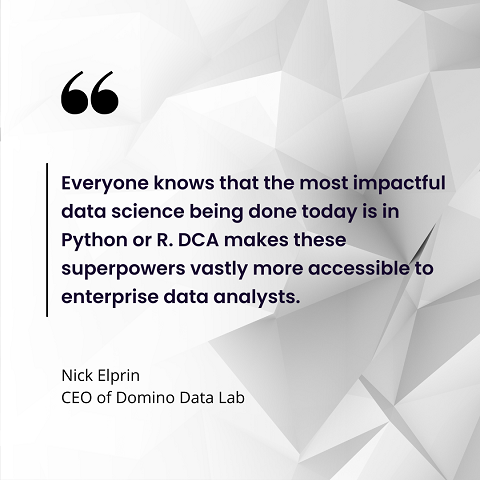Domino Code Assist Aims to Bridge Data Science Skills Gap
Domino Data Lab rolls out Domino Code Assist to help enterprises democratize data science, enabling business analysts to more easily use Python and R.

Domino Data Lab launched today its Domino Code Assist (DCA) technology to make it easier for data scientists and business analysts to work together to build machine learning workflows.
Domino's namesake platform is machine learning operations (MLOps) technology that can help organize and track data science operations across an enterprise. DCA is a low-code tool that provides a visual interface to help non-technical users within an organization generate sophisticated Python and R code for common data science operations.
Related: The End of the Full-Stack Data Scientist
According to the company, DCA can help democratize data science and analytics for chief data officers (CDOs) and business users alike in a number of ways. For starters, DCA can help solve the "cold start" issue, making it faster for non-technical business analysts. Secondly, the company claims that DCA exposes low-code business analysts to well-written code. Also, Domino will help to better align all data science work within an organization, as it lowers the barrier to entry.
Domino Code Assist Bridges Data Science Gap to Open Source Tools
"With Code Assist, data scientists and code-curious analysts can specify selections in a GUI that will generate code to perform complex data manipulations and generate complex visualizations," Nick Elprin, co-founder and CEO of Domino Data Lab, told ITPro Today. "Previously, one would need to write this code explicitly by themselves, a barrier that discourages some less technical analysts from engaging with these great open source tools."

Elprin-Domino
Elprin explained that Code Assist adds a GUI layer to several popular open source data science libraries. Among the libraries are Pandas and Vaex for data transformation, Plotly for data visualization, and Solara for Jupyter app building and deployment.
Prior to the release of DCA, it wasn't possible to use these libraries meaningfully without code, he said.
How Domino Code Assist Is Integrated into the Domino Platform
DCA is now built into Domino, so anyone using Jupyter notebooks or RStudio in Domino for data science operations will benefit from it, according to Elprin.
Related: Data Scientist Careers Are Evolving — Here's Why
"This makes Domino valuable to a large population of analysts and data scientists less comfortable writing complex code from scratch," he said. "These folks can use Domino to develop and deploy ML models, but also to perform ad hoc analyses, descriptive statistics tasks, or scientific computational research such as simulations."
Elprin noted that DCA has multiple integrations with existing Domino features. For example, DCA provides a GUI to browse data that is registered in the Domino platform, making it easier to discover and utilize standard data sets and data sources. DCA also makes it easy to publish interactive analytical apps and dashboards using Domino's existing app hosting capabilities, he added.
"We're seeing DCA vastly upskill analysts at our customers who do not currently view themselves as code-first," Elprin said. "Everyone knows that the most impactful data science being done today is in Python or R. DCA makes these superpowers vastly more accessible to enterprise data analysts."

SM-kerner_66
Sean Michael Kerner is an IT consultant, technology enthusiast and tinkerer. He consults to industry and media organizations on technology issues.About the Author
You May Also Like








.jpg?width=700&auto=webp&quality=80&disable=upscale)
